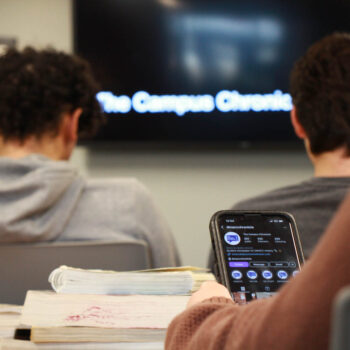
Photo illustration by Katie Hirth
On Jan. 24, Gov. Reynolds proposed a bill that would ban “Personal Electronic Devices” in the classroom for grades K-12. This would not affect any post-secondary education institutions like DMACC. The Iowa Senate passed the bill Monday March 24, it will now move to the House for a vote.
Not only would this bill ban cell phones in classrooms, but it would also require instruction related to the effects of social media to be incorporated into the health curriculum for students in grades 6-8. The bill, however, would not set the standard for how cell phones would be banned; that is up to the district’s discretion.
A Pew Research poll from 2024 found that 72% of high school teachers reported phones being a “major problem” in the classroom. However, in school districts with phone policies, 60% of high school teachers said it was very or somewhat difficult to enforce policies compared to 30% of middle school teachers.
A 2022 study from the New York Institute of Technology found that phones in the classroom negatively impacted students’ learning. The study stated, “The negative association between cell phone use and course comprehension is consistent with previous studies. This finding adds to the growing body of literature that suggests that distracted students perform worse in the classroom.”
Out of the 106 students in the study, those who put their phones away reported “higher levels of course comprehension, lower levels of anxiety, and higher levels of mindfulness.”
One supporter of the bill is Micheal Davenport, who teaches theatre and social studies at Roosevelt High School in Des Moines.
He said in an email interview, “When [students] are glued to their phones, they miss out on the deeper understanding that comes from real conversation, inquiry, and critical thinking.”
Davenport also said, “Education should prepare students for real-life challenges, and that includes teaching them the value of being present in the moment rather than lost in their screens.”
On the Governor’s official website, Gov. Reynolds said, “Cell phones are not only a distraction but a deterrent to development in the classroom … Let’s return the classroom to a place for learning, growth, and connection to give students their best chance at success.”
Although this does not impact DMACC students, and DMACC does not have an official cell phone policy, some professors have their own policies to minimize classroom phone use and foster a better learning environment.
Rachel Murdock is the Design, Media, and Arts Pathway Chair at DMACC. Murdock said, “My own policy is that you only use computers or phones in class if you are doing classwork. My syllabus says: ‘Computer Ethics: Personal and university computers and devices should be used only for class-related activities during class. Phones should be in your bags or pockets.’”
Luke Mueller is a sophomore from Des Moines who is studying business at DMACC. He said in an email interview, “I feel like I learn a lot more the less I’m on my phone. But most of my teachers are pretty lenient when it comes to phone usage, more of a ‘you use you lose’ mindset.”
Ansira Irakoze, a freshman from Altoona studying liberal arts, said in an email interview, “It’s too easy to be distracted by texting and social media! Your notifications will still be there when class is over.”
When asked if DMACC should have an overall phone policy, Irakoze said, “I feel like DMACC should have a phone policy, but they should be flexible and reasonable. Unlike high school, where stricter rules might be necessary, college students are adults and should have the freedom to manage their own phone usage.”
Although technology is distracting for some, for others it can be an aid.
Those who have learning disabilities, such as those with motor, vision, or speech impairments, might require the use of technology in the classroom in order to access material and more easily process it.
Students with motor impairments can use tablets to improve coordination. NOVA Chat is a speech-generation device that has text-to-speech programs to help students with reading and speaking in class. There are also personal magnification devices for those with challenged vision.
In January of 2024, the Department of Education released guidelines for assistive technology and noted that these devices improve child motivations and outcomes. The Iowa bill, HS106, does not currently make exceptions for students with disabilities, but they would presumably be protected under the federal Individuals with Disabilities Act (IDEA).





Comments